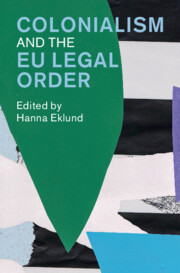Diamond Ashiagbor, Professor of Law and 125th Anniversary Chair at the University of Birmingham, United Kingdom
Amel Benrejdal Boudjemaa, Associate Professor at the Faculty of Law, Algiers University 1, Algeria
Daniela Caruso, Professor Emerita at the Boston University School of Law, United States
Veronica Corcodel, Assistant Professor in European and International Law at NOVA School of Law, Portugal
Stephen Coutts, Lecturer in Law at the University of Edinburgh, United Kingdom
Marise Cremona, Professor Emeritus at the Law Department, European University Institute, Italy
Véronique Dimier, Professor of Political Science at the Free University of Brussels, Belgium
Hanna Eklund, Assistant Professor of Constitutional Law at the University of Copenhagen, Denmark
Michel Erpelding, Research Group Leader at the Max Planck Institute for Legal History and Legal Theory, Germany
Karim Fertikh, Associate Professor of Political Sciences at the University of Strasbourg, France
Ulla Neergaard, Professor of EU Law at the University of Copenhagen, Denmark
Kako Nubukpo, Professor of Economics at the University of Lomé, Togo, and Commissioner of the West African Economic and Monetary Union, Burkina Faso
Janine Silga, Assistant Professor in European Law at Dublin City University, Ireland
Iyiola Solanke, Jacques Delors Professor in EU Law and Fellow of Somerville College, University of Oxford, United Kingdom
Antoine Vauchez, CNRS Research Professor at the Paris 1 Panthéon-Sorbonne University, France
Lionel Zevounou, Research Professor at the École des hautes études en sciences sociales (EHESS), France
Book contents
- Colonialism and the EU Legal Order
- Law in Context
- Colonialism and the EU Legal Order
- Copyright page
- Contents
- Contributors
- Acknowledgements
- Table of Cases (In Chronological Order)
- Table of Treaties, Instruments, and Legislation (In Chronological Order)
- Chapter 1 Colonialism and the EU Legal Order
- Part I Law
- Part II Actors
- Part III Exits
- Part IV Futures
- Index
Contributors
Published online by Cambridge University Press: 14 October 2025
- Colonialism and the EU Legal Order
- Law in Context
- Colonialism and the EU Legal Order
- Copyright page
- Contents
- Contributors
- Acknowledgements
- Table of Cases (In Chronological Order)
- Table of Treaties, Instruments, and Legislation (In Chronological Order)
- Chapter 1 Colonialism and the EU Legal Order
- Part I Law
- Part II Actors
- Part III Exits
- Part IV Futures
- Index
Information
- Type
- Chapter
- Information
- Colonialism and the EU Legal Order , pp. xi - xiiPublisher: Cambridge University PressPrint publication year: 2025
- Creative Commons
- This content is Open Access and distributed under the terms of the Creative Commons Attribution licence CC-BY-NC 4.0 https://creativecommons.org/cclicenses/
Accessibility standard: WCAG 2.0 A
Why this information is here
This section outlines the accessibility features of this content - including support for screen readers, full keyboard navigation and high-contrast display options. This may not be relevant for you.Accessibility Information
Content Navigation
Allows you to navigate directly to chapters, sections, or non‐text items through a linked table of contents, reducing the need for extensive scrolling.
Provides an interactive index, letting you go straight to where a term or subject appears in the text without manual searching.
Reading Order & Textual Equivalents
You will encounter all content (including footnotes, captions, etc.) in a clear, sequential flow, making it easier to follow with assistive tools like screen readers.
You get concise descriptions (for images, charts, or media clips), ensuring you do not miss crucial information when visual or audio elements are not accessible.
You get more than just short alt text: you have comprehensive text equivalents, transcripts, captions, or audio descriptions for substantial non‐text content, which is especially helpful for complex visuals or multimedia.
Structural and Technical Features
You gain clarity from ARIA (Accessible Rich Internet Applications) roles and attributes, as they help assistive technologies interpret how each part of the content functions.
